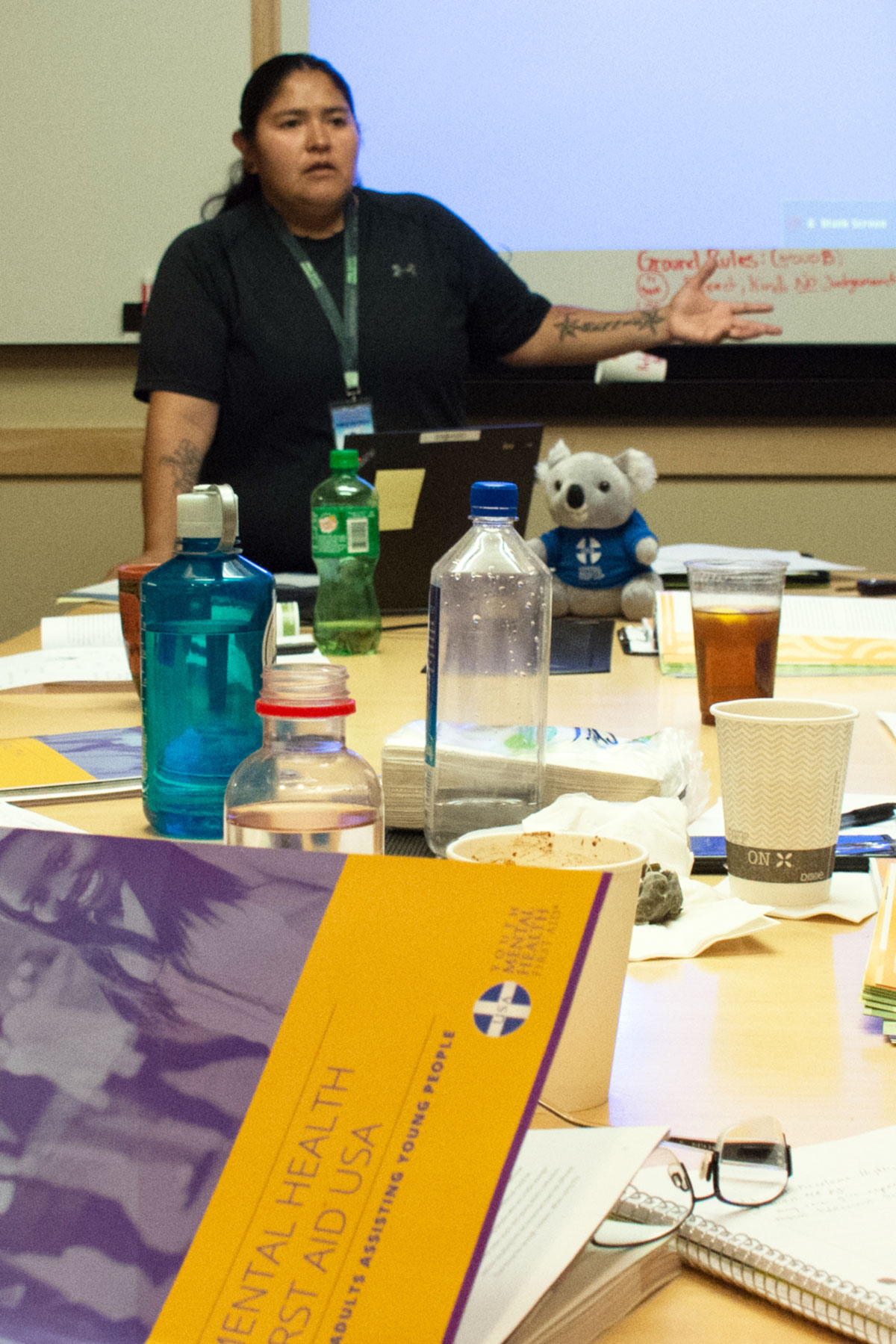Our mental health is an important aspect of our daily lives. In many cases it is often not understood. Instead it is viewed as a taboo and one that should not be discussed based on fear of weakness or misunderstanding. This stigma continues on today alive and well, but is slowly being chipped away by the many programs and organizations that aim to change the way we view mental illness. The Tribal Health department is attempting to tackle the issue head on.
On May 1, Precious Collins taught an eight-hour course on Youth Mental Health First Aid (YMHFA) to the staff members of the Tribal Health Department in order to allow for more services specific to mental health to be provided. The Mental Health First Aid Training gives its students the ability to recognize when a person is in need and how to aid them properly. For many people with mental illness, this aid can be a lifeline if they are exhibiting suicidal thoughts and actions. The YMHFA training is one step to allow the department to reach their goal to “show and have respect, dignity, honor and customer service for the tribal membership,” by providing care for any and every tribal member that uses the department and its services.
“[YMHFA] started it conversation on what areas we can improve on and what extra steps we can take for those people that need them,” said instructor Precious Collins. “We already deal with people in crisis, so it made sense to try and get the entire department trained.”
The course’s training encourages its students to play a similar role to what is seen in CPR and First Aid. Like both trainings, Mental Health First Aid does not give students the ability to diagnose a person in need, but rather give aid and get help from a professional. The course emphasizes the importance of seeking help and encourages its students to always remember their role as an aid.
“We encourage you to get help…to call a professional,” explained Collins. “We are the ‘middle men.’”
One of the most important skills that is taught through the course is the ability to recognize and help aid with any signs of distress. This distress can come in many forms from panic attacks to suicide.
For many Native American communities, suicide is one of the biggest issues that is also viewed as taboo. Statistics from Mental Health America show that suicide is the second leading cause of death for Native Americans from the ages of 10 to 34. There are many factors that come into play for Native Americans that have a negative effect on their mental health.
“Native American communities suffer from historic trauma, poverty, low economic growth, drugs and alcohol abuse,” explained Collins.
Along with these factors the biggest issue that remains is that mental health and suicide remain a taboo topic for many Native Americans. Many individuals are unaware of the impact of mental health and its effect and believe it should not be discussed in any detail. Instead of reaching for help, a cycle ensues causing individuals to instead seek “treatment” from unhealthy practices, like alcoholism and drug abuse. These methods of coping lead to more problems and do not allow a person to get the help they need.
The Tribal Health Department aims to counteract the stigma and resulting issues by taking steps to ensure that a person comes first. The department has now changed their verbiage in how a patient is addressed by addressing, the person — before the disability. This is a small step that can make a big change on any negative stereotypes that might be held about a person’s mental health. Along with this, the Tribal Health Department hopes the YMHFA will help youth catch the early signs of mental health illnesses and issues.
“Adolescence is when many issues with mental health grow,” said Collins. “Some [illnesses] will grow later on, like depression, which hits mostly in a person’s 30’s.”
According to National Network of Depression Centers, depression is the leading cause of disability among people the ages of 15 to 44, while two-thirds of people with depression do not seek the treatment they need. In many cases, mental illness is not recognized by teens until later in life or they do not receive the treatment they need.
“If we catch [mental illness] at a younger age, teens will have the ability to have a more fulfilling life, which can help with aiding in treatment. It gives a higher chance to save lives,” said Collins.
Along with the introduction of YMHFA, and the growing awareness of mental health, the Tribal Health Department is also responsible for the successful Color Run during the month of April each year to raise awareness for child abuse. For the department, these are steps with big impacts to ultimately reach their mission and goal, while also helping change how we view our mental health and many other issues present in today’s society.
“Why don’t people get the help that they need?” asked Collins. “We are living in a world where mental health issues are more common.”
If interested in more information please visit, mentalhealthfirstaid.org or contact Precious Collins at ppg_collins@gmail.com
If you or anyone else you know is dealing with suicidal thoughts or actions, please call 911 or the National Suicide Hotline at 1-800-273-8255.

